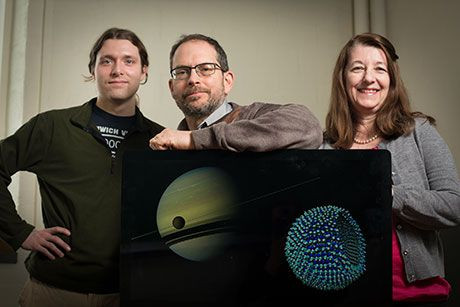Methane-Based Life Possible On Saturn's Moon Titan, Research Shows

Researchers from Cornell University, Ithaca, New York modeled a new type of life form that depends on methane for its survival. The theorized anaerobic life form, which is capable of performing reproduction and metabolism in a manner similar to that of life on earth, indicates that life is capable of thriving on Saturn’s moon Titan.
Titan is believed to have vast hydrocarbon oceans and rivers made of liquid methane at temperatures that would preclude the possibility of existence of Earth-like organisms. However, the moon's unique conditions might allow certain methane-based organic matter to exist on it, and even give rise to organisms that do not need oxygen and water for their survival.
Researchers theorized the presence of an "azotosome" -- a cell membrane made of nitrogen, carbon and hydrogen molecules -- as opposed to the phospholipid membrane found on terrestrial cells. The azotosome is capable of functioning in liquid methane, which is present in abundance on Titan, at temperatures of 292 degrees below zero.
In theory, these azotosomes could have the same stability and flexibility as the cell membranes on Earth, the scientists said.
“We’re not biologists, and we’re not astronomers, but we had the right tools,” Paulette Clancy, a chemical molecular dynamics expert, who led the study, said, according to a statement released by Cornell University, adding: “Perhaps it helped, because we didn’t come in with any preconceptions about what should be in a membrane and what shouldn’t. We just worked with the compounds that we knew were there and asked, ‘If this was your palette, what can you make out of that?’”
The theory was published in Friday's edition of journal Science Advances. The paper was co-authored by Jonathan Lunine, director for Cornell's Center for Radiophysics and Space Research. Lunine is also an expert on Saturn’s moons and an interdisciplinary scientist on the Cassini-Huygens mission that discovered hydrocarbon seas on Titan. In the statement, Lunine added that he looked forward to the prospect of sending a probe to Titan's seas to test the ideas outlined in the paper.
The authors of the paper said: “Measurement of the trace organic components of the sea, which perhaps may exhibit prebiotic chemical evolution, will be an important objective, and a benthic sampler (a robotic grabber to sample sediment) would acquire and analyze sediment from the seabed,” according to a report by SMN Weekly.
© Copyright IBTimes 2025. All rights reserved.






















